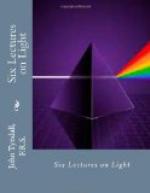’But none of these distinguished men betrayed the least knowledge of the connexion between the bright bands of the metals and the dark lines of the solar spectrum; nor could spectrum analysis be said to be placed upon anything like a safe foundation prior to the researches of Bunsen and Kirchhoff. The man who, in a published paper, came nearest to the philosophy of the subject was Angstroem. In that paper, translated by myself, and published in the “Philosophical Magazine” for 1855, he indicates that the rays which a body absorbs are precisely those which, when luminous, it can emit. In another place, he speaks of one of his spectra giving the general impression of the reversal of the solar spectrum. But his memoir, philosophical as it is, is distinctly marked by the uncertainty of his time. Foucault, Thomson, and Balfour Stewart have all been near the discovery, while, as already stated, it was almost hit by the acute but unpublished conjecture of Stokes.’
Mentally, as well as physically, every year of the world’s age is the outgrowth and offspring of all preceding years. Science proves itself to be a genuine product of Nature by growing according to this law. We have no solution of continuity here. All great discoveries are duly prepared for in two ways; first, by other discoveries which form their prelude; and, secondly, by the sharpening of the inquiring intellect. Thus Ptolemy grew out of Hipparchus, Copernicus out of both, Kepler out of all three, and Newton out of all the four. Newton did not rise suddenly from the sea-level of the intellect to his amazing elevation. At the time that he appeared, the table-land of knowledge was already high. He juts, it is true, above the table-land, as a massive peak; still he is supported by the plateau, and a great part of his absolute height is the height of humanity in his time. It is thus with the discoveries of Kirchhoff. Much had been previously accomplished; this he mastered, and then by the force of individual genius went beyond it. He replaced uncertainty by certainty, vagueness by definiteness, confusion by order; and I do not think that Newton has a surer claim to the discoveries that have made his name immortal, than Kirchhoff has to the credit of gathering up the fragmentary knowledge of his time, of vastly extending it, and of infusing into it the life of great principles.
With one additional point we will wind up our illustrations of the principles of solar chemistry. Owing to the scattering of light by matter floating mechanically in the earth’s atmosphere, the sun is seen not sharply defined, but surrounded by a luminous glare. Now, a loud noise will drown a whisper, an intense light will overpower a feeble one, and so this circumsolar glare prevents us from seeing many striking appearances round the border of the sun. The glare is abolished in total eclipses, when the moon comes between the earth and the sun, and there are then seen a series




